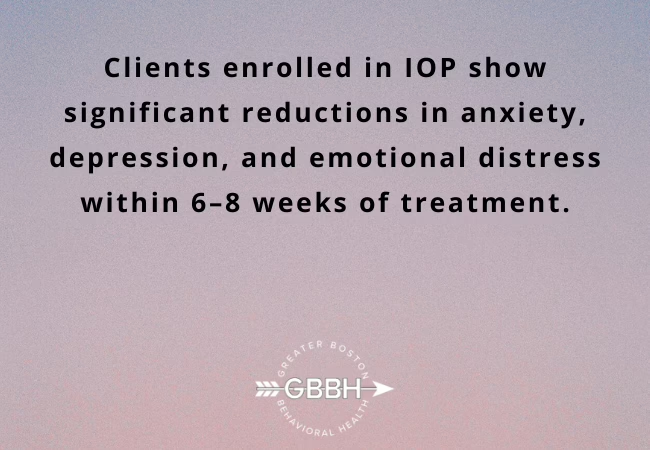Struggling with your mental health doesn’t always mean you need to step away from your job, family, or daily responsibilities. For many individuals, the right level of care is one that offers intensive therapeutic support without full-time hospitalization. This is exactly what an Intensive Outpatient Program (IOP) is designed to provide.
At Greater Boston Behavioral Health, our Intensive Outpatient Program in Boston offers a structured, evidence-based solution for individuals seeking help with conditions like depression, anxiety, trauma, mood disorders, and emotional dysregulation. It’s also ideal for those transitioning from inpatient care or seeking to prevent relapse. This blog explores the unique benefits of IOP and how it helps individuals manage their mental health while continuing to live their lives.
What Is an Intensive Outpatient Program (IOP)?
An IOP is a form of structured mental health treatment that typically includes 3–5 days per week of therapy, for 2–4 hours per session. It is more intensive than weekly outpatient therapy, yet more flexible and less restrictive than a Partial Hospitalization Program in Boston (PHP) or Inpatient Treatment Program in Boston.
IOP may include:
- Individual therapy
- Group therapy
- Psychiatric evaluation and medication management
- Skills training (such as CBT and DBT)
- Psychoeducation and relapse prevention
- Family therapy and care coordination
IOPs are especially valuable for those who need focused support but wish to maintain their roles at work, in school, or at home.
Key Benefits of IOP for Mental Health Management
1. Flexibility to Maintain Daily Responsibilities
One of the biggest advantages of IOP is that it offers therapeutic care without requiring you to pause your life. Sessions are typically scheduled during morning or evening hours, allowing clients to:
- Attend work or school
- Care for children or family members
- Participate in community or religious activities
- Continue living at home
This balance between treatment and independence helps reinforce autonomy while still receiving the support you need to recover.
2. Access to Evidence-Based Therapies
At Greater Boston Behavioral Health, our IOP incorporates a range of proven therapeutic methods, including:
- Cognitive Behavioral Therapy Boston (CBT): Helps identify and change negative thinking patterns and behaviors.
- Dialectical Behavior Therapy in Boston (DBT): Focuses on mindfulness, emotion regulation, interpersonal effectiveness, and distress tolerance.
- Anger Management Therapy in Boston: Teaches clients how to recognize triggers, express emotions constructively, and manage frustration without aggression.
These modalities are used to treat conditions such as:
- Depression
- Anxiety and panic disorders
- PTSD
- Bipolar disorder
- Personality disorders
- Trauma-related symptoms
- Emotional and behavioral dysregulation
3. Structured Support Without Hospitalization
IOP provides a predictable, structured schedule that many people need when managing mental health challenges. It reduces the risk of crisis by:
- Offering early intervention when symptoms escalate
- Providing access to daily peer and professional support
- Keeping clients engaged in a consistent routine
- Creating accountability for progress and attendance
For many, this level of structure is the key to preventing hospitalization or stepping down from a more intensive program like PHP or residential care.
4. Connection Through Group Therapy and Community Support
Mental health struggles can be isolating. In IOP, clients engage in group therapy sessions, which foster:
- Peer support and shared understanding
- Practice with communication and relational skills
- Feedback from others facing similar challenges
- A sense of belonging and community
These group interactions can be deeply healing and empowering—especially when paired with individual therapy and psychiatric care in Boston.
5. Customized, Holistic Treatment Plans
No two people are alike—and neither are their treatment needs. Our Mental Health Programs in Boston begin with a full assessment that takes into account your:
- Diagnosis and symptom severity
- Treatment history
- Lifestyle and responsibilities
- Support network and environment
- Personal goals for recovery
From there, we create a tailored IOP plan that includes individual and group therapy, medication support, family involvement, and long-term planning. Our team also works closely with you to modify your plan as your needs evolve.
6. Effective for Step-Down or Step-Up Care
IOP plays a vital role in our full continuum of care at Greater Boston Behavioral Health. It serves both as:
- A step-down option for individuals leaving inpatient, Residential Treatment Program in Boston, or Partial Hospitalization Program in Boston
- A step-up option for those not improving in standard outpatient therapy or at risk of mental health deterioration
This flexible positioning makes IOP an effective transitional tool, helping clients stabilize, regain confidence, and continue progressing without regression.
7. Focus on Long-Term Skill Building and Relapse Prevention
A core goal of IOP is not just short-term symptom relief—but long-term resilience. Clients in our IOP develop practical skills to:
- Manage stress and emotional reactivity
- Cope with triggers and past trauma
- Prevent relapse into harmful behaviors or thought patterns
- Build healthier relationships and support networks
- Sustain progress through lifestyle changes and continued care
By combining therapeutic insight with everyday application, IOP sets the stage for sustainable mental wellness.
Who Is IOP Right For?
You may benefit from an IOP if:
- Weekly therapy sessions are no longer enough to manage your symptoms
- You’re transitioning out of inpatient or residential treatment
- You’re experiencing increased anxiety, depression, or emotional dysregulation
- You’re at risk of hospitalization and need a more structured environment
- You want to work on your mental health without stepping away from daily life
Whether you’re dealing with mood swings, trauma, or ongoing emotional overwhelm, our IOP can help you regain clarity, connection, and control.
How IOP Supports Emotional Regulation and Resilience
Mental health recovery isn’t just about reducing symptoms—it’s about building the tools to handle future challenges more effectively. One of the most powerful benefits of IOP is how it helps clients develop emotional regulation and long-term resilience.
Through structured sessions in Cognitive Behavioral Therapy (CBT) and Dialectical Behavior Therapy (DBT), IOP clients learn to:
-
Recognize emotional triggers and early warning signs of relapse
-
Practice grounding and mindfulness techniques during distress
-
Reframe negative thinking patterns
-
Strengthen frustration tolerance and reduce impulsivity
Whether it’s handling conflict at work, navigating anxiety in public, or managing intrusive thoughts, these daily skills help clients feel more prepared and confident in everyday situations. This makes IOP not just treatment—but training for real life.
IOP as an Early Intervention Tool to Avoid Crisis Care
Many people mistakenly think they need to be in crisis to enter an intensive program—but the truth is, IOP can be a powerful preventive tool.
Starting IOP early—at the first signs of functional decline—can help:
-
Prevent psychiatric hospitalization by stabilizing symptoms before they escalate
-
Reduce reliance on emergency care, such as ER visits or crisis intervention services
-
Improve treatment adherence, especially for individuals who may otherwise disengage from weekly therapy
-
Support early recovery for those dealing with trauma, grief, life transitions, or burnout
At Greater Boston Behavioral Health, we encourage individuals not to wait until they hit rock bottom. IOP provides the structure and support that helps you regain momentum—before things get worse.
Why Choose Greater Boston Behavioral Health?
At Greater Boston Behavioral Health, we offer a uniquely compassionate, clinically rigorous Intensive Outpatient Program in Boston that meets the diverse needs of our community.
Here’s why individuals and families trust our care:
- Multidisciplinary expertise: Licensed therapists, psychiatrists, and support staff with deep experience in complex mental health care
- Evidence-based therapies: CBT, DBT, trauma therapy, anger management, and more
- Full continuum of care: We offer inpatient, PHP, IOP, and long-term outpatient therapy to match every stage of recovery
- Holistic and individualized treatment plans designed for real-world success
No matter where you’re starting, we’ll meet you with care, respect, and a roadmap for sustainable healing.
Conclusion
You don’t need to choose between mental health recovery and your daily responsibilities. An Intensive Outpatient Program can provide the balance you’ve been looking for—intensive therapeutic support and the freedom to stay connected to your life.
At Greater Boston Behavioral Health, we understand that healing happens not only in therapy sessions but also in the moments between—at home, at work, in relationships. That’s why our IOP is designed to walk with you, not pull you away. Call (888) 278-0716 to schedule a confidential assessment and see if IOP is right for you.
FAQ on Intensive Outpatient Programs (IOP)
What is an Intensive Outpatient Program (IOP)?
IOP is a structured treatment program offering therapy, psychiatric care, and skill-building several days a week while allowing clients to live at home.
Who is a good candidate for IOP?
IOP is ideal for those with moderate mental health symptoms, individuals transitioning from inpatient care, or anyone needing more support than weekly therapy can provide.
What conditions are treated in IOP?
IOP effectively treats depression, anxiety, PTSD, bipolar disorder, trauma, emotional dysregulation, and co-occurring substance use and mental health conditions.
How long does IOP last?
Most IOPs last between 4 to 12 weeks, depending on individual needs. Clients typically attend sessions 3–5 days a week for 2–4 hours per day.
Does IOP interfere with work or school?
No. IOP is designed for flexibility, with morning, midday, or evening scheduling options to accommodate daily responsibilities like work, school, or parenting.


